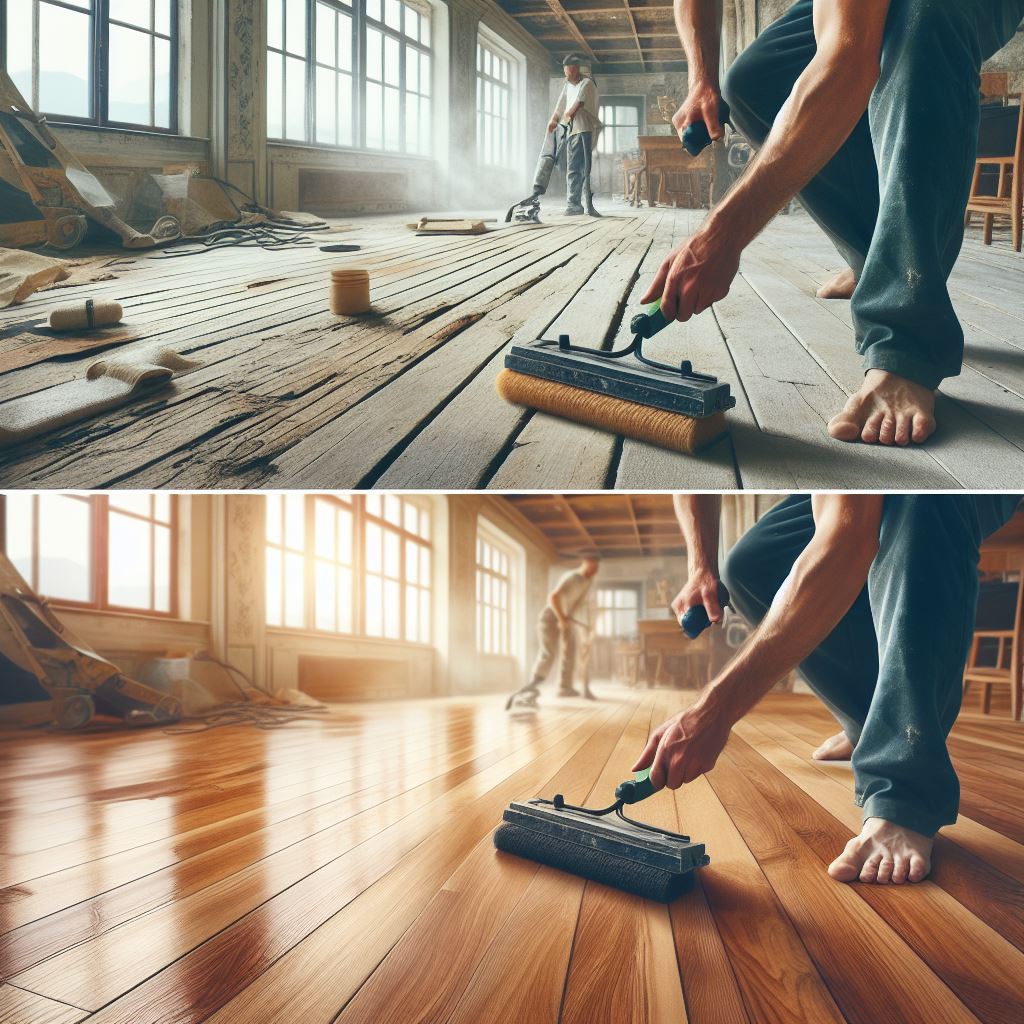When it comes to choosing the perfect flooring for your home or business in New Zealand, engineered wood flooring stands out as a top contender. This type of flooring combines the natural beauty of hardwood with modern manufacturing techniques to create a product that is both durable and versatile. Engineered wood flooring is crafted from multiple layers of wood, with a solid wood veneer on top and high-quality plywood or HDF (high-density fiberboard) beneath. This construction offers enhanced stability and resistance to moisture compared to traditional solid wood flooring.
One of the main attractions of engineered wood flooring is its aesthetic appeal. It provides the same warm, rich look as solid hardwood, making it a popular choice for those looking to add a touch of elegance to their interiors. Additionally, it is available in a wide range of finishes, colors, and wood species, allowing you to find the perfect match for your design preferences.
Another significant advantage is its ease of installation. Engineered wood flooring can be installed using various methods, including floating, gluing, or nailing down, making it suitable for a variety of subfloors and installation scenarios. This flexibility, combined with its durability, makes it an excellent choice for different areas of the home, including kitchens and basements where moisture levels might be higher.
If you're considering upgrading your flooring, request a free estimate or email us at sales@paradise-spaces.com to get started on transforming your space with engineered wood flooring.
Factors Affecting Engineered Wood Flooring Price

The cost of engineered wood flooring in New Zealand can vary significantly based on several key factors. Understanding these factors can help you make an informed decision that aligns with your budget and flooring needs.
1. Quality of Materials: The quality of the wood used in both the top veneer layer and the core layers greatly influences the price. Higher-quality woods, such as oak or walnut, will generally be more expensive than less expensive alternatives like pine or birch. Additionally, the thickness of the top veneer can affect the price; thicker veneers offer more durability and the option for refinishing.
2. Wood Species: Some wood species are rarer and more desirable, thus commanding higher prices. Exotic woods like Brazilian cherry or mahogany can be significantly more expensive than more common species like maple or ash.
3. Finish and Texture: The type of finish applied to the flooring, such as oil-based or water-based polyurethane, can impact the cost. Pre-finished planks are generally more expensive than unfinished ones, but they save time and labor costs during installation. Additionally, special textures like hand-scraped or wire-brushed finishes can add to the price.
4. Installation Method: The method used for installation—floating, glued-down, or nailed-down—can also affect the overall cost. Some methods require more labor and materials, leading to higher expenses.
5. Brand and Manufacturer: Reputable brands often come with a higher price tag due to their quality assurance, warranties, and customer support. Investing in a well-known brand can offer peace of mind and long-term value.
By understanding these factors, you can better navigate the market and find engineered wood flooring that fits both your aesthetic desires and budget constraints.
Average Cost of Engineered Wood Flooring in NZ

When budgeting for engineered wood flooring in New Zealand, it's essential to have a clear understanding of the average costs you might encounter. While prices can vary based on the factors mentioned earlier, here is a general guide to help you estimate expenses.
Material Costs: On average, the cost of engineered wood flooring ranges from NZD $50 to $150 per square meter. Entry-level options with thinner veneers and less expensive wood species typically fall at the lower end of this range. Premium options, featuring thicker veneers and high-quality or exotic wood species, can reach the higher end.
Installation Costs: Installation costs will vary depending on the method chosen and the complexity of the job. For instance, floating floors are generally easier and less costly to install compared to glued-down or nailed-down methods. On average, you can expect to pay between NZD $30 to $70 per square meter for professional installation. Complex layouts, staircases, or subfloor preparation can add to these costs.
Additional Expenses: Don't forget to account for additional costs such as underlayment, trims, and moldings. These can add another NZD $10 to $20 per square meter to your budget. If your subfloor requires leveling or repairs, this can also increase the overall cost.
Total Cost Estimate: Combining material and installation costs, the total expense for engineered wood flooring can range from NZD $80 to $240 per square meter. For a standard 20 square meter room, this would translate to a total cost of NZD $1,600 to $4,800.
By having a clear understanding of these average costs, you can better plan your flooring project and ensure it aligns with your financial expectations.
Benefits of Choosing Engineered Wood Flooring

Engineered wood flooring offers a multitude of benefits that make it an attractive option for homeowners in New Zealand. Understanding these advantages can help you make an informed decision for your flooring needs.
Durability and Stability: One of the most significant benefits of engineered wood flooring is its exceptional durability and stability. Due to its multi-layered construction, it is less prone to warping and shrinking compared to solid wood, making it ideal for areas with fluctuating humidity and temperature.
Aesthetic Appeal: Engineered wood flooring provides the same timeless beauty and elegance as solid wood. With a wide array of wood species, finishes, and textures available, you can easily find a style that complements your home’s decor.
Ease of Installation: Engineered wood flooring can be installed using several methods, including floating, gluing, or nailing. This flexibility allows for easier and sometimes faster installation compared to solid wood. Additionally, many engineered wood products come with click-lock systems, further simplifying the installation process.
Eco-Friendliness: Opting for engineered wood flooring is also an environmentally conscious choice. The manufacturing process utilizes less hardwood per plank compared to solid wood, preserving valuable natural resources. Additionally, many manufacturers use sustainable practices and materials, further reducing the environmental impact.
Cost-Effectiveness: While engineered wood flooring can range in price, it generally offers a more cost-effective option compared to solid wood. This affordability, combined with its long lifespan and low maintenance requirements, makes it an excellent investment for any homeowner.
Versatility: Engineered wood flooring is suitable for various applications, including basements and areas with underfloor heating systems, where traditional solid wood might not be ideal. Its adaptability makes it a versatile flooring choice for multiple rooms and settings.
With these benefits in mind, it’s clear why engineered wood flooring remains a popular choice for homeowners seeking both beauty and functionality in their flooring.
Tips for Buying Engineered Wood Flooring in NZ

When investing in engineered wood flooring in New Zealand, making an informed purchase is crucial. Here are some essential tips to guide you through the buying process:
Research Different Brands and Suppliers: Not all engineered wood flooring is created equal. Take the time to research various brands and suppliers to ensure you are getting a high-quality product. Look for reviews and testimonials from other customers to gauge the reputation of the manufacturer.
Check the Thickness of the Wear Layer: The wear layer is the top layer of the engineered wood plank, and its thickness can significantly affect the floor's longevity. A thicker wear layer will allow for more refinishing in the future, extending the life of your flooring.
Consider the Core Material: The core of engineered wood flooring can be made from different materials, such as plywood, high-density fiberboard (HDF), or medium-density fiberboard (MDF). Plywood cores generally offer better stability and are less susceptible to moisture damage, making them a preferable choice.
Examine the Warranty: A good warranty can provide peace of mind and protect your investment. Check for warranties that cover a reasonable period and include protection against common issues like delamination, wear, and structural integrity.
Assess the Installation Method: Depending on your skill level and the specifics of your project, the installation method can be a significant factor. Some engineered wood flooring options come with click-lock systems that are easy for DIY installations, while others might require professional installation.
Match the Flooring to Your Lifestyle: Consider your household's lifestyle when choosing your flooring. If you have pets or young children, opt for a product with a durable finish that can withstand scratches and spills.
Request Samples: Before making a final decision, request samples of the flooring. This will allow you to see how the color and texture match your home’s interior and how the material feels underfoot.
By following these tips, you can ensure that you select the best engineered wood flooring for your home in New Zealand, combining aesthetic appeal with practical functionality.
Conclusion and Final Thoughts
Investing in engineered wood flooring for your home in New Zealand can enhance both the value and aesthetic appeal of your living spaces. By understanding the costs and benefits, and following essential buying tips, you can make a well-informed decision that aligns with your needs and budget.
Our comprehensive price guide has highlighted the key factors that influence the cost of engineered wood flooring in NZ, from material quality to installation methods. This knowledge empowers you to make cost-effective choices without compromising on quality.
When it comes to selecting the right flooring, always consider aspects such as wear layer thickness, core material, and installation methods. These factors play a critical role in the durability and longevity of your flooring, ensuring that it continues to look stunning for years to come.
Remember, the right flooring can transform your home, creating an inviting and stylish atmosphere. If you’re ready to take the next step, we invite you to request a free estimate or email us at sales@paradise-spaces.com. Our team at Paradise Spaces is here to assist you with expert advice and top-quality products tailored to your specific needs.
Thank you for considering Paradise Spaces for your flooring needs. We look forward to helping you create the perfect living space with our premium engineered wood flooring options.
